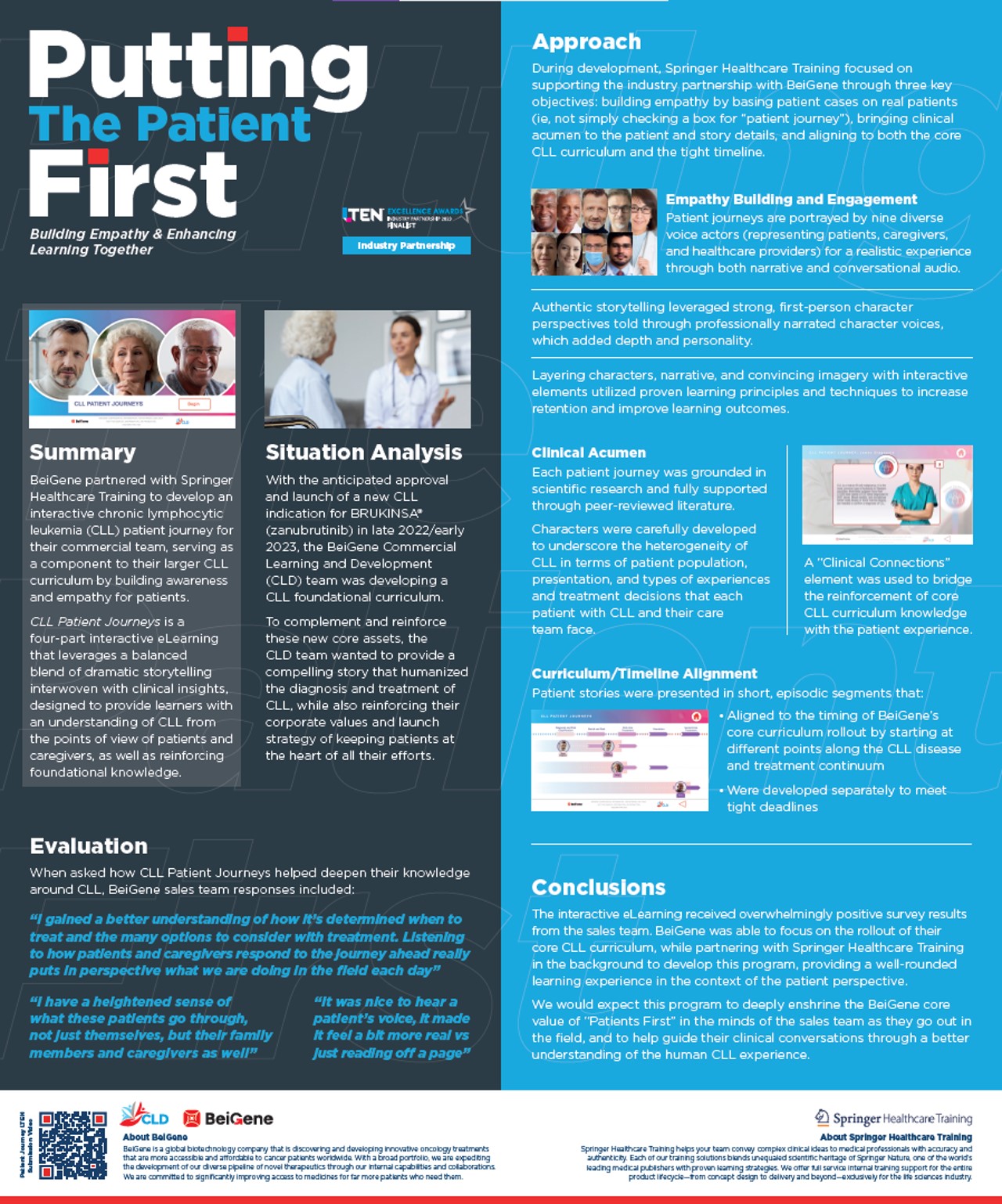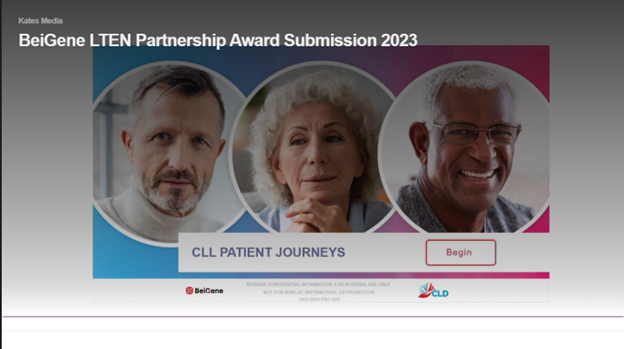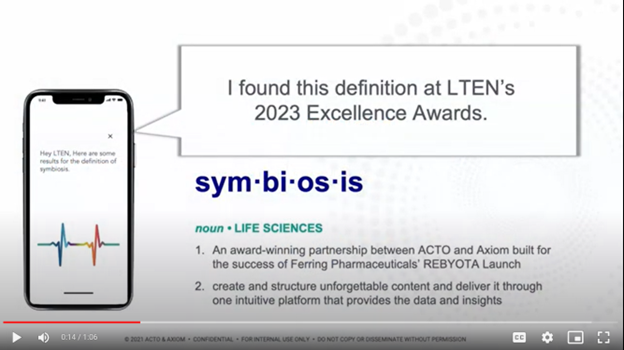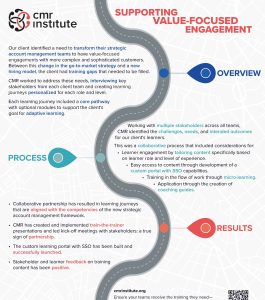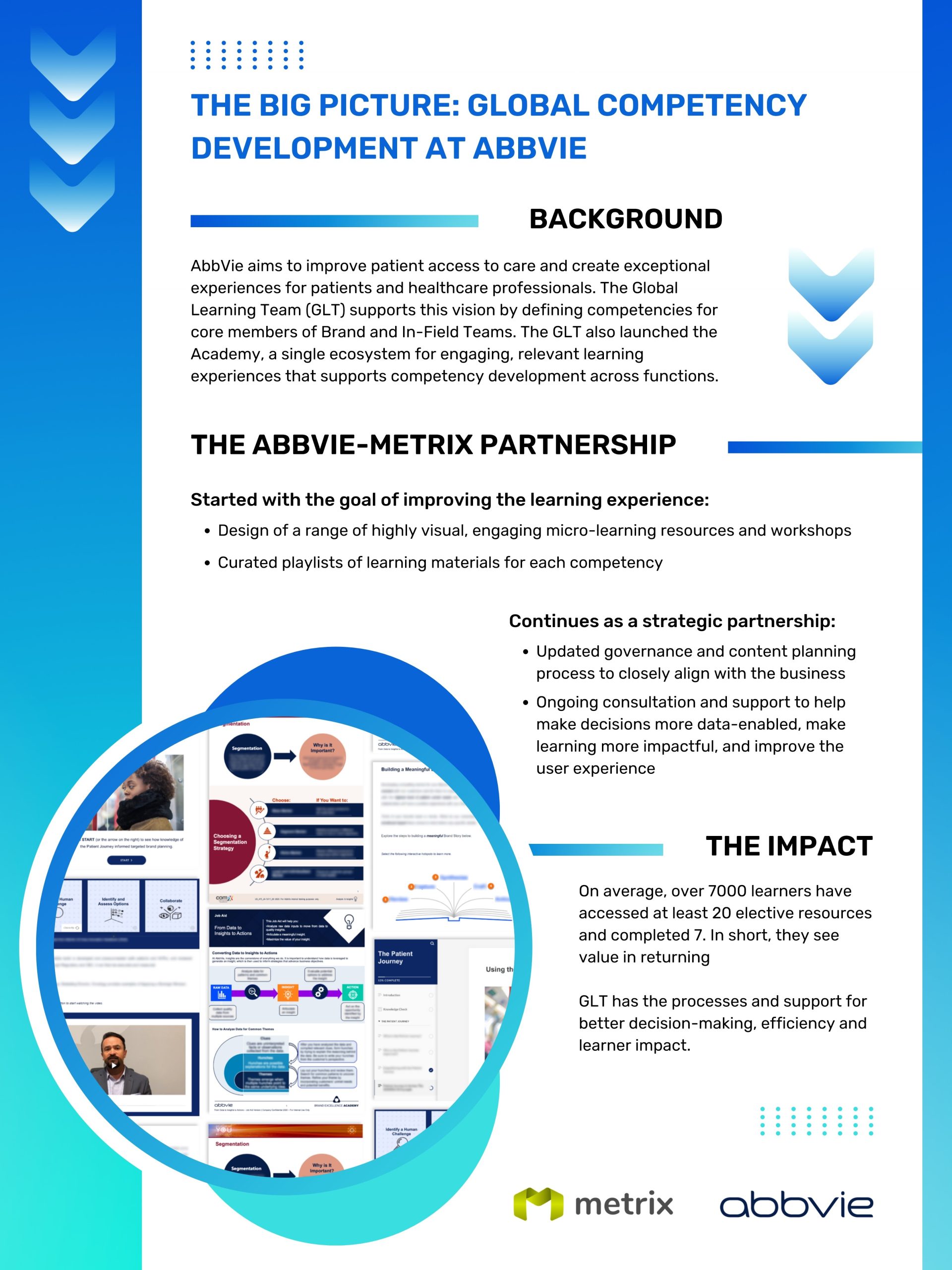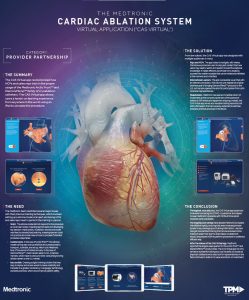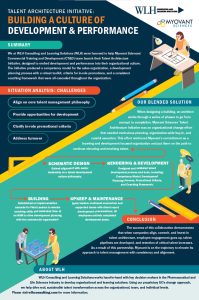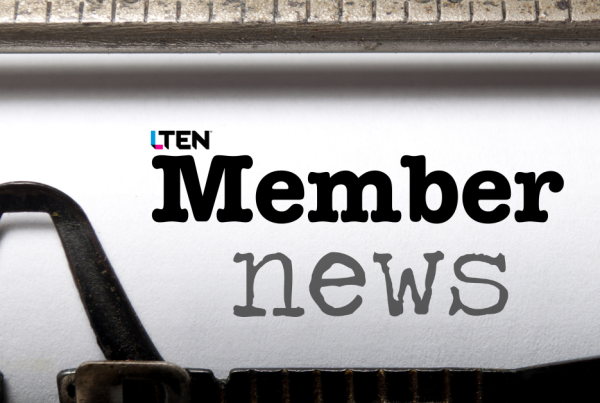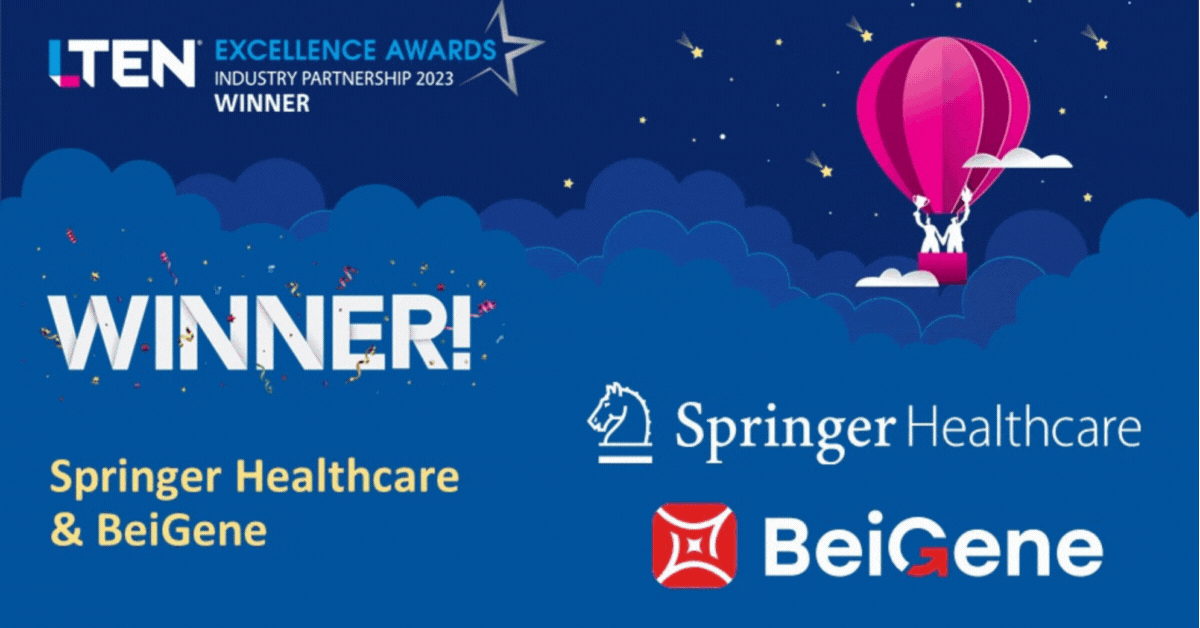
-
ACTO, Ferring Pharmaceuticals, and Nazaré (formerly Axiom)
-
CMR Institute
-
Metrix Group and AbbVie
-
Quantified and Novartis
-
Salience Learning and Bristol Myers Squibb
-
Tipping Point Media and Medtronic
-
WLH Consulting & Learning Solutions and Myovant Sciences
Springer Healthcare & BeiGene
Transforming CLL Education with Innovation and Compassion
It is with great pleasure that we announce that Springer Healthcare and BeiGene have been named the winner of this year’s LTEN Excellence Award in the Industry Partnership category for their exceptional collaboration on the “CLL Patient Journeys” initiative.
An Insightful Exploration of CLL
In a groundbreaking partnership, Springer Healthcare joined forces with BeiGene to craft “CLL Patient Journeys,” a 4-part module designed to offer learners a profound understanding of Chronic Lymphocytic Leukemia (CLL) from the unique perspectives of patients and their caregivers. Rooted in research and listening sessions with actual patients and caregivers, this innovative module sheds light on the diverse nature of CLL, exploring various disease stages and the treatment continuum. It engages learners through authentic storytelling, multimedia, and compelling voice actors, weaving essential clinical insights into the personal narratives.
Addressing a Critical Need
BeiGene’s commercial training team faced a significant challenge as they prepared for the anticipated approval and launch of BRUKINSA® (Zanubrutinib) for CLL in 2022. This complex curriculum had been four years in the making, following BeiGene’s commercialization in the United States. While the core training curriculum covered disease state, diagnosis, and treatment options, BeiGene sought to cultivate awareness and empathy among learners by providing an in-depth exploration of CLL from a patient’s perspective. Springer Healthcare was entrusted with the task of developing an interactive CLL patient journey to complement BeiGene’s training.
Building a Realistic CLL Patient Journey
Springer Healthcare, after reviewing BeiGene’s previous patient journey module, recommended an enhanced version featuring self-paced, interactive segments interwoven with clinical check-ins. The partners embarked on creating a four-segment patient journey that truly represented the impact of CLL on patients and caregivers. They took into account the heterogeneity among CLL patients, reflecting various experiences and treatment decisions. Due to evolving scheduling needs, they opted for a scalable solution, starting with one patient’s journey and expanding over time to align with BeiGene’s broader CLL training plan. The module was developed in Articulate Storyline, featuring professionally narrated character voices to guide learners.
Challenges and Collaborative Solutions
Unlike a previous patient journey project, the collaboration with Springer streamlined patient details upfront, eliminating the need for BeiGene to provide extensive guidance. Given tight timelines, the partners decided to develop one CLL patient episode at a time, ensuring that each patient’s story was complete before moving to the next. This agile approach helped them adapt to changing timelines and deliver high-quality content efficiently.
Learner-Centric Approach
The CLL patient journey module was designed to immerse learners in the patient’s perspective, addressing concerns such as symptoms, co-morbidities, quality of life, genetic testing, treatment options based on NCCN guidelines, and potential treatment-related adverse events. The story was enriched through the perspectives of two additional characters: a caregiver/companion and a healthcare professional. This approach provided depth and emphasized key points, creating a comprehensive learning experience.
Impressive Results
The module received highly positive survey results from BeiGene’s sales representatives, enabling BeiGene to focus on its core CLL curriculum rollout while developing this capstone program in the background. The patient journeys deepened the sales team’s understanding of CLL, allowing them to connect with patients on a personal level. This, in turn, enshrines BeiGene’s philosophy of “Patient First” in the minds of sales professionals, guiding their clinical conversations through a deeper understanding of CLL from the human perspective.
Key Takeaways for Future Partnerships
The success of this program offers valuable lessons for future partnerships:
- Frequent meetings for content alignment from the beginning expedite content development.
- Limiting the number of key stakeholders aids in obtaining necessary approvals without delays.
- Effective communication of changing timing needs is crucial for project continuity.
- Considering smaller-scale, incremental development from the project’s outset enhances flexibility and adaptability.
The partnership between Springer Healthcare and BeiGene illustrates how effective collaboration and a focus on the learner can result in a transformative learning experience that deepens understanding and aligns with the company’s core values.
Meet the Finalists
ACTO, Ferring Pharmaceuticals & Nazaré (formerly Axiom)
Pioneering Symbiotic Partnerships in Pharmaceutical Training
In a remarkable showcase of partnership excellence, ACTO, the performance excellence platform, and Nazaré, (formerly Axiom), a leading scientific content provider, joined forces with Ferring Pharmaceuticals Inc to craft an immersive training experience. Targeting over 150 learners, including community and institutional sales professionals, brand managers, sales leadership, and patient/market access teams, this collaboration epitomizes the spirit of symbiotic partnerships.
The Call for Transformation
Ferring Pharmaceuticals embarked on a journey to create a comprehensive content strategy and launch event platform for their groundbreaking microbiota-based live biotherapeutic, REBYOTA. Inspired by the concept of “Symbiotic Partnerships,” which mirrored the balance of the microbiome achieved with REBYOTA, ACTO and Nazaré were entrusted with the task of delivering engaging, strategic curricula.
Meeting Complex Training Needs
The goal was to equip learners with a deep understanding of microbiota-based live biotherapeutics. This required the development of robust scientific training content through an immersive life science learning platform, delivered in phases to build foundational knowledge. The partnership demanded expertise not only in content creation but also in creating a seamless learning experience with data insights. Senior leaders sought robust data for evaluating training effectiveness.
Innovative Training Development
The collaborative effort between ACTO and Nazaré harnessed the power of microlearning. This approach involved crafting clear, concise, and bite-sized learning modules that addressed the evolving science behind this new therapy. The learning journey included videos, podcasts, infographics, and short eLearning modules. The close partnership between ACTO and Nazaré enabled the creation of the innovative creative theme of “The Journey of Care,” reflecting the complexities of the gut microbiome’s impact on C. difficile infection. The partnership allowed for responsive adaptation as needed.
Project Timeline
- Pre-launch strategy: This phase utilized a microlearning approach to develop content focusing on disease state education, unmet needs, competition, and clinical data while integrating the patient journey.
- Launch event: Content for the launch event was organized into an integrated learning platform, including event registration, pre-work tracking, gamification, virtual meetings, and post-event resources.
- Post-launch phase: The ongoing phase involves identifying and addressing learning gaps based on platform data and analytics, implementing tactics to sustain learning from the launch, and proactively responding to emerging needs in the evolving therapy landscape.
Overcoming Challenges as Partners
The partnership effectively addressed last-minute requests during the launch event, demonstrating seamless collaboration between Nazaré and ACTO. Urgent requests, like developing assessment questions, were handled with agility.
Best Interests of All Stakeholders
The partnership between ACTO and Axiom aimed to set a higher standard for Ferring’s RBX2660 launch and its sustainability. It resulted in reduced time and long-term costs, eliminated redundant processes, increased efficiency, and ensured content continuity, ultimately delivering a best-in-class learner experience.
Demonstrable Results
- Two weeks post-launch, an impressive 99.6% completion rate was achieved across all learning sets.
- The completion data indicated high learner engagement and successful knowledge acquisition.
A Message from Ferring Pharmaceuticals:
Ellen Amos, Commercial Training Manager-Microbiome at Ferring Pharmaceutical, expressed that the partnership between ACTO and Nazaré was the best she had experienced in her eight years in the pharma industry. The collaboration facilitated creative learning content delivery through microlearning, which aligned with the future of life sciences training and engaged learners effectively. ACTO’s platform allowed Ferring to gain insights into learner behavior and adapt training accordingly. The partnership offered a unified approach to realizing the learner’s vision and translated into a successful response from learners.
Lessons Learned
The experience shared by the partners in developing the RBX2660 launch program highlighted the importance of setting clear expectations, robust planning, and attention to detail. The development of a seamless microlearning journey required careful strategy and alignment among stakeholders.
A Symbiotic Success
The partnership between ACTO and Nazaré, in collaboration with Ferring Pharmaceuticals, stands as a testament to symbiotic partnerships in the pharmaceutical industry. It illustrates how collaboration, innovation, and creative learning approaches can result in high learner engagement, cost-efficiency, and successful knowledge transfer. This partnership has not only met but exceeded the best interests of all stakeholders and is a harbinger of the future of training and development in the life sciences.
CMR Institute & a Leading Pharmaceutical Company
Redefining Learning Journeys
CMR Institute, in collaboration with a leading pharmaceutical company, has undertaken a remarkable initiative to revolutionize commercial learning and prepare their teams for value-focused engagement. Their work addresses the challenges posed by a transition to value-based interaction and the introduction of industry-naïve representatives. With over 750 learners from multiple commercial roles, the partnership aimed to bridge training gaps by redefining the learning experience.
Meeting Evolving Training Needs
The client identified the need to equip its strategic account management teams with the skills required for value-focused engagement with complex and sophisticated customers. This transformation also involved the integration of various roles with shared and adjacent capabilities. To cater to these changing dynamics, the partnership embarked on creating customized learning journeys, allowing learning in the flow of work.
Innovative Learning Content Delivery
A unique challenge arose as the client’s LMS was being phased out while the new LXP had not yet been deployed. In response, CMR Institute, together with the client’s technology team, designed and developed a custom content delivery portal with a single sign-on (SSO) feature, ensuring seamless access to learning content.
The initiative took flight when the client reached out to CMR Institute in late 2021. Multiple meetings with client stakeholders helped identify their needs and deliverables. CMR utilized a client needs assessment and engaged key stakeholders to design role-based learning journeys. These journeys included core and optional content based on specific topics, learner needs, and tenure.
Flexibility Amidst Change
The project spanned a complex landscape with shifting priorities and organizational changes. CMR Institute maintained close communication with key decision-makers and adapted to timeline changes. Freely providing content access to multiple reviewers and end-users allowed buy-in and input, ensuring alignment with evolving needs.
Tailored Learning Journeys
The partnership’s collaborative process aimed to tailor content based on learner role and experience level, enhance access through the custom portal with SSO capabilities, and promote microlearning in the flow of work. It also emphasized involving leaders through coaching and facilitator guides to drive content application and eliminate the need for additional pull-through resources.
Fostering a Learning Culture
The unique components of this training approach, including a different delivery method from the traditional LMS and the SSO feature, fostered versatility and ease of learning in a secure environment. The use of facilitator guides added depth to the learning process, addressing knowledge gaps and enabling the client to cultivate a learning culture across the US market and other groups.
A Collaborative Partnership
The collaboration between CMR Institute and a leading pharmaceutical company has been instrumental. CMR Institute worked closely with multiple stakeholders to ensure the alignment of learning journeys with the competencies of the new strategic account management framework. Moreover, they provided train-the-trainer presentations and kick-off meetings, demonstrating a true partnership.
Positive Feedback and Ongoing Collaboration
The learning journeys and the custom learning portal with SSO have been successfully developed and implemented, receiving extremely positive feedback from stakeholders. CMR Institute’s ongoing involvement in addressing learning gaps and development opportunities has become an integral part of the client’s organization.
CMR Institute’s partnership with a leading pharmaceuticals company exemplifies how collaboration, innovation, and adaptability can transform commercial learning, ensuring teams are equipped for value-focused engagement in an ever-changing landscape. This partnership lays the foundation for a culture of continuous learning and development.
Metrix Group & AbbVie
A Strategic Partnership to Transform Learning
Metrix Group’s strategic partnership with AbbVie has demonstrated a profound commitment to developing a skills-based approach to employee development through its learning ecosystem known as The Academy. Their collaborative effort with The Academy has transformed learning and development, improving the lives of patients while achieving measurable results.
Addressing AbbVie’s Vision
AbbVie’s long-term vision revolves around making a remarkable impact on patients’ lives. This vision encompasses enhanced patient access to care, outstanding patient and healthcare professional experiences, and the concept of “OneAbbVie” – a unified, collaborative, and impactful team. To equip teams with the right capabilities for success, AbbVie established Core Capability Strategies and Competencies across various functions. This laid the foundation for The Academy, a single ecosystem for relevant learning experiences that support competency development.
Challenges and Opportunities
The partnership was triggered by the need for significant content redesign and updates to align with the new competency framework. Multiple functions and teams had been operating in silos, leading to redundancies and duplication of efforts. Although a significant volume of content existed, gaps remained in supporting competency development.
Personalized Learning Model
AbbVie aimed to move toward a personalized learning model to enhance engagement and retention. Training through The Academy was intended to be on-demand and learner-driven, covering foundational to mastery levels. Metrix emerged as a strategic partner, contributing its expertise to align content with AbbVie’s vision.
Versatile Partner and Content Redesign
Metrix created engaging and “micro” learning experiences to support competency development for teams such as Brand, Medical, Market Access, Public Affairs, and Government Affairs.
Becoming a True Strategic Partner
The partnership evolved, and Metrix assumed a more strategic role. It worked with AbbVie to analyze existing assets, identify gaps, and create learning paths for each competency from foundational to mastery levels. The collaboration was highly interactive, involving over 40 hours of working sessions to ensure content alignment.
Impacting Business and Learners
The Academy was elevated as a top priority for 2023, demonstrating its importance in achieving commercial excellence. More than 7,000 learners accessed the platform, with high satisfaction rates. Performance improvement is monitored through the global competency assessment.
Lessons for Future Collaborations
- Strong collaboration is essential due to the complexity of work.
- Simplification is key to managing complex frameworks and content.
- Taking a long-term view for strategic planning and refinement is critical for sustained success.
Metrix’s partnership with AbbVie and The Academy is a testament to how strategic collaboration and content transformation can align with a company’s vision, simplify learning, and drive value for the business and its learners. This partnership represents a profound commitment to improving patient outcomes while achieving measurable business results.
You can learn more about AbbVie here. To learn more about Metrix and our work, connect with us at www.metrixgroup.com or on LinkedIn!
Quantified & Novartis
Driving Sales Performance by Igniting Impact
Quantified.ai’s partnership with Novartis, as part of the Igniting Impact initiative, is transforming the sales training and learning and development landscape for Novartis’ customer-facing teams. The collaboration has led to significant results and valuable lessons for future partnerships.
Addressing Key Industry Challenges
The partnership with Novartis was initiated in response to critical challenges faced by customer-facing teams, including the need to differentiate themselves in an era of information overload, the increasing importance of every interaction with healthcare professionals (HCPs), and the lack of data and insights in critical moments. Quantified.ai’s innovative approach, powered by artificial intelligence, addressed these challenges by focusing on assessing and improving soft skills crucial for customer engagement.
Scalability and User-Centric Design
A key achievement of the partnership was the development of a platform that is highly scalable and easily accessible to Novartis employees. Quantified’s use of AI for assessing individual communication skills ensures scalability with rapid results. Recognizing that Novartis’ sales reps predominantly used iPads, Quantified’s flexibility in adapting to this preference increased adoption rates. The user-centric design allowed reps and managers to use the platform anytime, anywhere, aligning with their on-the-go schedules.
Supporting Practice and Feedback
The partnership focused on the creation of a platform that supported practice and provided actionable feedback. It accommodated both solo and paired practice, allowing reps to practice on their own and engage in role plays with peers or managers. The streamlining of feedback into three crucial areas made the platform user-friendly and actionable. Through supported practice and immediate data-driven feedback, Novartis reps and managers have gained invaluable insights to enhance their skills.
Adoption Challenges and Customized Rollouts
The partnership faced challenges related to user adoption and engagement, which are common when implementing new tools across a large organization. To address these challenges, customized rollouts were conducted to meet the specific needs of different teams. By aligning Igniting Impact with other initiatives and even gamifying it, teams were more likely to view it as a tool for growth and collaboration.
Leadership Support and Communication
The partnership leveraged the support of senior leaders within Novartis teams to champion the tool and encourage adoption. Custom programs were designed to cater to the communication priorities of leaders, enhancing their ability to articulate the organization’s vision. Open communication and over-communication played a significant role in the success of the initiative, facilitating regular dialogue and problem-solving.
Achieving Measurable Results
The partnership has delivered substantial results, including a 26% average improvement in sales communication capabilities. The use of Quantified’s platform has reduced the number of Novartis sellers below the Sales Attainment Benchmark, demonstrating its effectiveness in enhancing sales performance. For the first time, Novartis sales leaders can objectively measure performance against the 6IB selling model, leading to more targeted coaching and optimized focus. Furthermore, the partnership’s data exchanges have enabled insights into behaviors correlated with top sales performers.
Key Lessons for Future Partnerships
- Dedicated support from both sides is essential to ensure ownership, accountability, and alignment.
- Effective communication and regular dialogue are crucial for successful collaboration.
- Openness and transparency within the partnership facilitate problem-solving.
- Leveraging senior leaders across the organization is instrumental in achieving desired results.
- Setting clear expectations for usage and engagement, along with scheduled reviews with senior leaders, ensures accountability and maximizes learning value.
The partnership between Quantified.ai and Novartis serves as an exemplary case of leveraging technology and collaboration to address real industry challenges, transform learning and development, and achieve measurable results. It also provides valuable insights for future partnerships looking to drive innovation and excellence in training and development.
For more information, contact Craig Sciglimpaglia, VP of Sales at Quantified.ai – LinkedIn
Salience Learning & Bristol Myers Squibb
Critical Thinking for First-Line Leaders
Salience Learning’s partnership with Bristol Myers Squibb (BMS) in the development and delivery of the Critical Thinking Academy has yielded significant benefits and provided valuable lessons for future partnerships.
Addressing Real Business Needs
The partnership between Salience Learning and BMS was initiated in response to real-world business needs. The life science industry was experiencing rapid changes, necessitating the development of learning solutions that targeted complex capabilities and thinking skills. The partnership aimed to create a solution that could be easily incorporated into an existing program, was flexible, customizable, and offered qualitative and quantitative assessments to demonstrate impact. Identifying these needs was crucial in shaping the direction of the partnership.
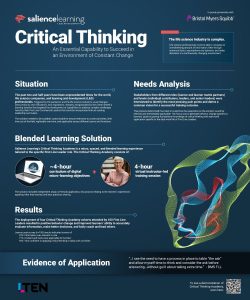 Responsive and Agile Development
Responsive and Agile Development
To meet these needs, the partnership followed an agile approach to create a learning solution that could be customized and adapted rapidly. Modular construction of content and designated sections for customization allowed for quick adaptation of content without significant disruption. The partnership utilized a blended learning approach, combining independent study, online modules, on-the-job application, and virtual instructor-led training. This blended approach catered to different learning preferences, schedules, and ensured long-term retention.
Engagement and Behavioral Change
Engagement was a key focus of the partnership, with microlearning, spaced learning, and cohort-based social learning methods employed to keep learners engaged and motivated. Micro plans and prompts were used to nudge learners to apply their critical thinking skills in real-world scenarios. Cognitive constructivism and active practice were integrated to ensure learners could apply their critical thinking skills to realistic situations.
Scalability and Customization
To address the challenge of scalability and customization for different job functions, the partnership developed a strategy that allowed for contextualization of the learning content. Interviews with BMS learners helped identify relevant examples, scenarios, and content that could be tailored to specific job roles. The modular approach to content development ensured that customization could be efficiently implemented without affecting core knowledge and behaviors.
Continuous Improvement
The partnership recognized the value of continuous improvement. Each cohort’s experience informed refinements to the learning process. The development of communication and show management processes enabled the partnership to deliver high-quality experiences consistently.
Measurable Learning Transfer
Learning transfer was a central focus, with evidence of application and engagement gathered through micro plans, performance activities, and learner feedback. Learners’ micro plans and quotes provided specific examples of how they applied critical thinking skills in their roles.
Learner-Centric Approach: The partnership placed learners at the center of the solution, engaging them, their leaders, and matrix partners in the needs analysis process. This ensured that the learning was relevant, actionable, and immediately applicable to their daily work.
In conclusion, the partnership between Salience Learning and Bristol Myers Squibb has demonstrated the value of an agile and learner-centric approach to addressing complex business needs. The success of the Critical Thinking Academy in improving critical thinking skills, learner engagement, and learning transfer underscores the effectiveness of this partnership. The lessons learned from this partnership can inform future collaborations and the development of impactful learning solutions.
Tipping Point Media & Medtronic
Revolutionizing Cryoablation Training with CAS Virtual
The partnership between Medtronic and Tipping Point Media resulted in the creation of the Medtronic Cardiac Ablation System Virtual application, or CAS Virtual. This innovative application has transformed how healthcare providers (HCPs) and sales representatives are trained to use Medtronic’s Arctic Front™ and DiamondTemp™ cryoablation catheters to treat atrial fibrillation. With CAS Virtual, learners can now train from anywhere using an iPad, simulating the cryoablation procedure as if it were in real life.
Identifying the Challenge
Medtronic recognized several issues with their traditional training methods for HCPs and sales representatives. These methods involved using a static silicone model of the heart for training, which was not dynamic and couldn’t replicate the real-time responses of a live heart during a procedure. Learners were gaining knowledge of the procedural steps but were not developing key decision-making skills. Moreover, the silicone heart model was based on standardized anatomy, making it challenging for learners to practice on unique or abnormal cases. Training for the Arctic Front™ devices was costly and cumbersome, while for DiamondTemp™ devices, most trainers were located outside the USA, making training difficult and costly for US HCPs.
The partnership with Tipping Point Media aimed to address these challenges by creating a digital training solution that was easy to deploy, accessible, scalable, and would ensure consistency in language, terminology, and best practices, ultimately improving patient safety.
Medtronic and Tipping Point Media devised CAS Virtual, a suite of simulations that runs on iPad devices, offering a step-by-step guide on how to use Medtronic’s cryoablation tools. Users can interact with the simulation, virtually operating the devices, and manipulating controls to perform the procedure steps while working with simulated monitors and interfaces. CAS Virtual includes:
- An interactive 3D heart model that provides insights into how the cryoablation devices interact with the heart’s inner mechanisms.
- Simulations of the monitors and interfaces used during the procedure.
- A simulation of the cryoablation devices that lets users control them using touchscreen inputs, replicating real-life device handling.
Overcoming Challenges
Several challenges were identified and addressed to strengthen the learning experience:
- Scalability and Ease of Access: CAS Virtual made training more accessible and efficient, eliminating the need for costly in-person sessions with silicone heart models.
- Static Models: The application used 3D heart models and provided modules for various techniques, including non-standard cases.
- Varied Audience and Use Cases: The app accommodated different experience levels and allowed learners to revisit specific sections for refresher training.
- Seat Time: CAS Virtual reduced the time needed for training by using time dilation, allowing learners to focus on key messages in a time-efficient manner.
- Free Play: The app offered a “try it yourself” section, where users could experiment with settings and see the device’s reflexive abilities.
- Expansion: The application combined training for different product families into one accessible platform, increasing efficiency.
Best Interests of Learners and Stakeholders
CAS Virtual was designed with various stakeholders in mind:
- Learners: The application was user-friendly, efficient, and catered to users with different levels of experience.
- International Users: CAS Virtual’s accessibility from anywhere with an internet connection facilitated international participation, including Latin American representatives.
- Medtronic: The application provided cost savings and a standardized framework for training, improving communication and consistency.
- Sales: CAS Virtual served as a powerful sales tool in addition to its primary training function.
Results and Lessons Learned
CAS Virtual had a significant impact:
- It provided cost savings of over $100,000 to Medtronic in a single year, replacing expensive in-person training.
- The application contributed to the largest sales quarter for products featured in the app.
- Training became consistent across the globe, fostering shared language and best practices.
- CAS Virtual allowed Medtronic to expand its reach and cut down on seat time.
Lessons for future partnerships include the importance of scalability, accessibility, flexibility, and efficiency in training solutions. The application not only met the current needs but also set the stage for the future of Medtronic’s training efforts, enabling hybrid training that combines virtual tools and live sessions. CAS Virtual has become a centerpiece in clinical procedural learning and a model for future training initiatives.
To learn more, please contact William Garner at garnerw@tipmedia.com.
WLH Consulting & Learning Solutions & Myovant Sciences
Creating a Culture of Development
Myovant Sciences, a thriving biotech company on the cusp of becoming a growth-oriented organization, faced the challenge of transitioning from startup mode to sustained growth and a culture of development. To establish a culture of development, Myovant Sciences needed a comprehensive human capital and Learning & Development (L&D) strategy that would harmonize the organization and convey its commitment to fostering and maintaining a culture of development. The answer lay in a partnership with WLH Consulting & Learning Solutions (“WLH”) for a Talent Architecture initiative. This initiative yielded a leadership competency model at all levels, a robust development planning process, and a consistent coaching framework, all of which were instrumental in creating a culture of development.
Identifying the Challenge
As a startup, Myovant Sciences had rapidly hired experienced talent to manage its strategic and operational priorities, which included product commercialization and executing three product launches within just 18 months. However, the leadership team members had different approaches to talent management, resulting in inconsistency, mixed messages, and misalignment. Furthermore, high leadership turnover, inconsistent working methods, and concerns about employee career advancement and development opportunities exacerbated the problem. To address these challenges, Myovant Sciences initiated a Talent Architecture project to establish a unified, consistent approach to talent management and provide employees with opportunities for career growth.
To overcome the challenge and embark on this extensive project, Myovant collaborated with WLH Consulting & Learning Solutions to define leadership competencies, establish in-role promotional criteria, create career frameworks, and design developmental experiences for various functional groups within the company.
The Talent Architecture project was multifaceted, requiring parallel workstreams and stages. Myovant Sciences collaborated with WLH to align leadership on the vision for talent development, core competencies, and promotional criteria, reflecting the organization’s commitment to transparency, fairness, and a culture of development. A core team of Sales Leaders, HR representatives, and L&D members held regular meetings to translate these key findings into tangible deliverables.
The project’s success was also dependent on aligning the various roles impacted by the initiative. Myovant Sciences adopted a communications plan, organized town hall events, and provided ongoing team updates to ensure that employees were informed and felt included in the development process.
The roll-out of the initiative included the training of sales and market access field leaders and the introduction of coaching skills to create and execute individual development plans. Myovant Sciences ensured that leaders were prepared to drive the talent development initiative within their teams.
Overcoming Challenges
In a growing startup, there is always a challenge related to available resources and time. Executives, HR, and senior sales leaders are often stretched thin, making it difficult to find time for their involvement in the talent development initiatives. Since Myovant’s different franchises tended to operate independently, aligning the teams across the organization and among senior leaders was also a challenge. The initiative required integration into other operational processes and various HR and Learning Management System (LMS) platforms. The leadership team recognized that the talent architecture project was a long-term effort and involved various functions. The initiative expanded beyond training programs, encompassing competency-based, on-the-job development and career pathway movement.
Best Interests of Learners and All Stakeholders
During the initiative, the Talent Architecture project team ensured that leadership support and sponsorship were present from the beginning. Periodic check-ins involving the Chief Commercial Officer and Franchise leaders reinforced the importance of the initiative. The Talent Architecture project aimed to create a culture of development, and it was essential to address the needs and concerns of the sales and market access leaders, making them better equipped for their roles.
To enhance the learning experience, the Talent Architecture initiative incorporated the LEARN. DO. INSPIRE. approach from WLH Consulting and Learning Solutions. The virtual kick-off meeting was designed to orient leaders to the development planning process and toolkit. The DO aspect allowed leaders to practice coaching skills, and the INSPIRE elements provided leader-led activities for teams and individuals.
Despite the experience of many leaders in coaching, the initiative offered a common coaching framework, enabling all leaders to work consistently and effectively with their teams. It encouraged the sharing of best practices and problem-solving among learners.
The initiative was designed to be delivered by internal Myovant leaders, signifying ownership and commitment to the development of talent within the organization.
Measurable Impact and Future Lessons
The Talent Architecture initiative at Myovant Sciences has had a considerable impact on the company, with strong leadership support driving its successful execution. The initiative has led to improved coaching and development for sales leaders and their teams, contributing to better leadership consistency and effectiveness. The updated competency model will be incorporated into the performance management process, ensuring continuous evaluation and development of employees.
This initiative has increased the confidence and consistency of sales leaders in coaching their teams, and Area Sales Directors have a clearer understanding of how to drive results through others. Overall, the Talent Architecture initiative has positively affected Myovant Sciences by improving its talent management approach, supporting the development of employees, and enhancing the success of the organization.
Lessons learned for the future include the importance of executive leadership support from the outset, the value of an internal partner facilitating the project, and the need for periodic check-ins to maintain alignment. It is also crucial to involve advisory groups to ensure that learning material is relevant and to keep all impacted roles informed of the project’s progress.
The partnership between Myovant Sciences and WLH Consulting & Learning Solutions demonstrates how a well-planned, comprehensive talent development initiative can align leadership and improve an organization’s approach to talent management. The initiative not only benefits employees’ development but also promotes a culture of development, translating into future growth and success for Myovant Sciences.
About the LTEN Excellence Awards
The LTEN Excellence Awards recognize the innovative and inspiring work done by life sciences training professionals at pharmaceutical, biotechnology, medical device and diagnostics companies (“practitioners”) and the strong support, innovation and creativity of training industry partner companies (“providers”).
Contact Us
For additional questions, please contact Awards@L-TEN.org.
Interested in sponsoring this year’s awards program? Contact Gregg Haunroth at ghaunroth@L-TEN.org

